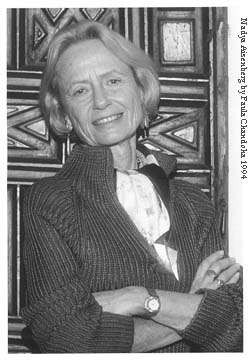

Nadya Aisenberg was writing on the
social implications of forgiveness in literature at the time of her sudden
death in April 1999. Possessing a double talent, for creative and theoretical
writing, Nadya published poetry and criticism in nearly equal parts. Before
We Were Strangers, Leaving Eden, and Measures (available
at Salmon Publishing Ltd.) collect poems that describe a search for a kind
of peace in exotic settings all over the world and at home, in the solitary
and communal, combining the languages of natural and social science, philosophy
and art. A committed feminist, she published two books on the subject of
feminism, Women of Academe: Outsiders in the Sacred Grove (co-authored
with Mona Harrington) and Ordinary Heroines: Transforming the Male Myth.
She also published
A Common Spring: Crime Novel and Classic and
We Animals: Poems of Our World (Sierra Club Books). Her book of
poetry, Leaving Eden, won the Bruce P. Rossley Award in 1995.
Nadya Aisenberg taught women’s studies
at Brandeis University. Over the years, she was a teacher of English at
Tufts University, Wellesley College, and the University of Massachusetts
at Boston. In the 1980s, she cofounded Rowan Tree Press, which published
30 titles. She was also a cofounder of the Cambridge Alliance of Independent
Scholars and on the Board of Directors of the Writers’ Room of Boston.
Born in New York City, she graduated from Bennington College and earned
a doctorate in English literature at the University of Wisconsin.
Her “forgiveness project” occupied her
thoughts and conversation for over a decade. Five of her finished essays
are presented here. At least two further essays, on forgiveness in Aeschylus’
Oresteia
and Henry James’s Wings of the Dove, were not completed, and there
may have been more. In her introductory paragraph, she describes how forgiveness
influenced the way she views major stages of her life and her writing.
Through narrative and poetry, feminism and pacifism, Aisenberg believed
that forgiveness was the key to understanding that often elusive mystery
that is ourselves.
| To poets |
 |